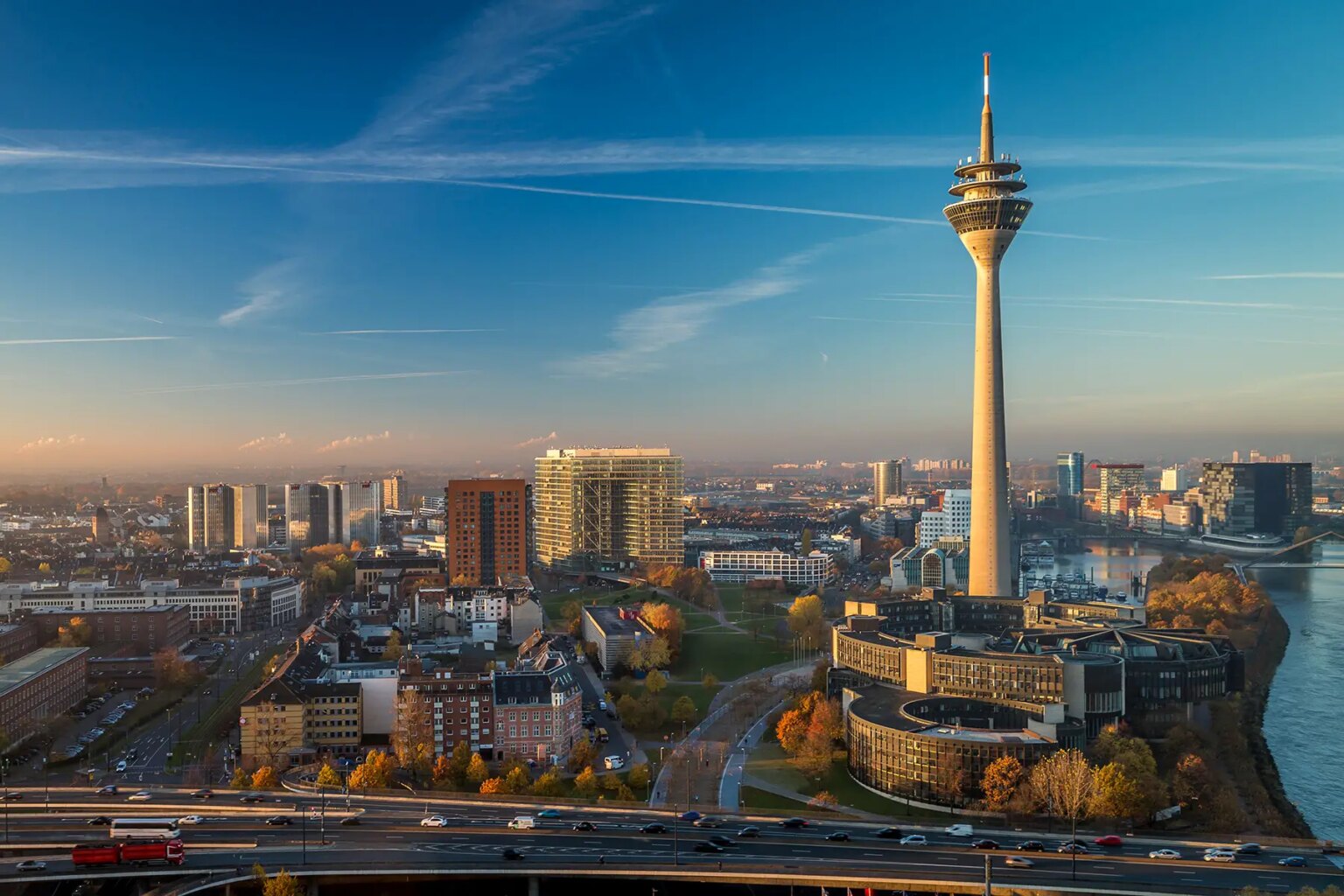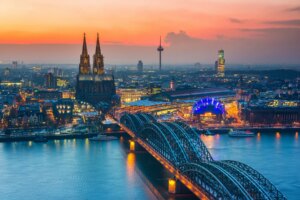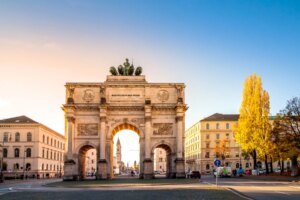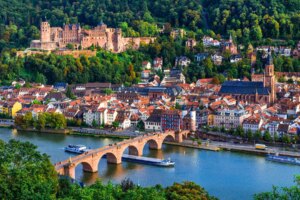The capital of the North Rhine-Westphalia state, Düsseldorf, is one of Germany’s international business and financial centers known for its trade fairs. It’s also one of Germany’s top cities for quality of life, so it’s unsurprising that many expats choose to relocate here. Discover what Düsseldorf offers and which neighborhoods are best for internationals to move to.
Continue for more on these topics:
Spotahome
Looking for somewhere to rent in Germany? Spotahome takes the hassle out of househunting by doing the hard work for you. Their online platform lets you find, view, and book rental properties all from the comfort of your own home. Take the stress out of househunting in Germany with Spotahome.
An overview of Düsseldorf
Often referred to as the “pearl on the Rhine,” Düsseldorf is a thriving and international city in Germany’s west. As of December 2021, about a quarter of its residents were expats, undoubtedly drawn in by the city’s job opportunities and great international schools.

From its humble beginnings as a village around 800 CE, Düsseldorf has blossomed into one of Germany’s key economic hubs. It’s a thriving metropolis, home to major national and international companies in finance, media, and fashion. The city’s six universities attract a diverse range of international students throughout the year.
There are ten districts in Düsseldorf, further divided into 50 neighborhoods. These include buzzing inner city areas and more peaceful and green suburban parts. Big attractions include Altstadt (Old Town), the pretty Königsallee shopping boulevard, and the 240-meter-high Rheinturm telecommunications tower. There are also excellent museums, restaurants, and over 100 art galleries.
Living in Düsseldorf, while rewarding, does come with a significant cost. The city’s cost of living is above the German average, ranking 74th on the 2023 Mercer Cost of Living City Ranking and making it the 6th most expensive city in Germany.
According to Numbeo, the monthly living costs for a single person in 2024, excluding rent, were €1,000, and for a family of four, it’s € 3,417.
Interestingly, Düsseldorf has the largest Japanese community in Germany. The city has around 8,400 Japanese nationals and 400 Japanese companies.
How can you find housing in Düsseldorf?
Whether you’re looking to rent or buy in Düsseldorf, there are plenty of avenues for searching for suitable accommodation. These include using a professional estate agent (makler), exploring the many property portals available, and utilizing local networks connected to the city – for example, social media groups.
If you decide to go through an agent, ensure they are registered and have a trade permit (Gewerbeerlaubnis) from the German Chamber of Commerce and Industry. Also, ask for a list of potential fees upfront so you don’t receive a surprising invoice later.
Finding housing online is one of the most popular modern methods. Good sites for accommodation in Düsseldorf include:
- HousingAnywhere: for apartments, studios, and shared accommodation
- Spotahome: good for short-term lets and flat-shares
For further support, the City of Düsseldorf website has a section (in German) with useful housing information, including housing benefits, subsidized housing, and information for new arrivals.
What is the typical accommodation in Düsseldorf?
Düsseldorf has various types of accommodation available, both new and old. These include individual townhouses and apartments within larger buildings. Rented accommodation is typically unfurnished as standard, although there are plenty of companies that supply furnished or serviced apartments.

Homes in Düsseldorf typically consist of a living room (Wohnzimmer), kitchen (Küche), bathroom (Badezimmer), and between one and three bedrooms (Schlafzimmer). Townhouses often have small gardens, while some apartments on higher floors have balconies.
Renting is common in Düsseldorf as it is across Germany, especially for those moving to the city who usually want to settle in first before thinking about buying a place. Germany has the lowest homeownership rates within the EU, with less than half of inhabitants (49.1%) owning their homes.
Renting in Düsseldorf
Many rentals are available in Düsseldorf, although competition can be fierce as it is a popular city to move to. Prices are slightly above German national averages. Using 2024 prices, you can expect to pay in the region of:
- €650–1,500/month for a one-bedroom property in the city center
- €600–1,250/month for a one-bedroom place outside the center
- €1,330–2,500/month for a three-bedroom place in the city center
- €1,100–2,000/month for a three-bedroom property outside the center
Once you find a place to rent in Düsseldorf, you typically have to pay a deposit – around three months’ rent – and provide necessary documentation such as photo ID and proof of income. Your landlord should give you a tenancy agreement or contract that details the rights and responsibilities of both parties.
Buying in Düsseldorf
You can buy a place in Düsseldorf if you prefer. Expats who move to Germany are not restricted from purchasing property, although getting a mortgage can sometimes be more challenging.
As with renting, prices in Düsseldorf are slightly more expensive than average when buying property. Here are the average costs as of May 2024:
- €5,000–8,500/square meter for a city center apartment
- €3,000–6,700/square meter for somewhere outside the center
It’s worth noting that there are a number of property websites, such as Engel & Völkers, where you can check current property prices in Düsseldorf and other German cities.
Which are the best neighborhoods in Düsseldorf?
Düsseldorf consists of ten districts (stadtbezirke) that subdivide into 50 neighborhoods (stadtteile). These districts are named simply 1–10. District 1 is the city center area. Districts 2–3 are also fairly central. District 4 is the only district on the west side of the Rhine. Districts 5–6 are in the north of the city. On the east side, you have 7–8, and down south, are 9–10.
Düsseldorf’s public transport system connects all of these districts and neighborhoods. Hoodmaps provides information on the different city areas.
Central Düsseldorf
Sitting on the eastern bank of the Rhine and consisting of six neighborhoods, Central Düsseldorf is District 1 (in German) and the city’s inner borough. It’s the most lively part of Düsseldorf – and contains some of the most expensive accommodation – but also has some quieter, greener parts on the outskirts.
Like most city centers, it’s very multicultural and popular with younger demographics with a disposable income and a hunger for the night-time culture. Altstadt (Old Town) is known informally as the ‘longest bar in the world’ due to having around 260 bars, clubs, and restaurants within half a square kilometer.
There are also many cultural attractions, including the gothic Basilika St Lambertus Church and the Kom(m)ödchen cabaret theater.

Meanwhile, Stadtmitte (city center) is where you’ll find Königsallee (often called Kö) and the Japanese quarter, which is filled with great Asian restaurants. Just south of the old town, the small but picturesque Carlstadt has a village feel with its cobbled streets and antique shops. There is a daily outdoor market where you can buy German and European foods.
You can find slightly cheaper housing on the outskirts. Derendorf is the most affordable central neighborhood, with residential complexes built on former industrial land. It’s also the base for big global companies such as L’Oreal and TK Maxx.
Pempelfort is the city’s arts and culture hub, with numerous museums and Jägerhof Castle. The University of Applied Sciences is also here, making it a popular place for students.
Finally, Golzheim is known for its fashion exhibitions and trade fairs. Its Rheinpark waterside park (in German) has also made it a mecca for water sports enthusiasts.
Düsseltal
Only a short commute from the center, Düsseltal is one of three neighborhoods in District 2. It has a fair amount of green space and some lovely residential areas where you can find cool apartments, townhouses, attractive villas, and nice condos.
It’s a popular neighborhood for families looking for somewhere a bit quieter but with good connections. The Zoopark, with its large duck pond, is one of the most beautiful parks in Düsseldorf. There are also good shopping areas, such as Rethelstrasse and Ackerstrasse.
Families with children can take advantage of excellent facilities, including adventure playgrounds, aqua play, and kid-friendly cafes. The neighborhood also boasts high-quality schools, ensuring a well-rounded education for your children.
Prices are a tad on the high side because this is one of the city’s most sought-after parts.
Bilk
The most populous neighborhood in Düsseldorf, Bilk sits in District 3 and can lay claim to being one of the city’s coolest quarters. Its residents include many expats and students – Heinrich Heine University is based here. In addition to having some top-rated international restaurants, Bilk has a vibrant nightlife and a buzzing underground scene. It’s the place to come if you’re into independent cinema or leftfield jazz.
Understandably, there is competition over living space in Bilk. It’s a popular neighborhood for young professionals and artsy types. However, housing and living costs are slightly cheaper than in the inner city. One of the most famous streets is Die Karolinger, which has a charming canal running down the middle. Other attractions in the area are the Rheinturm, the 20-storey Stadttor, and the Alt St Martin Kirche (the city’s oldest church).
Oberkassel
The Oberkassel neighborhood is on the left bank of the Rhine, one of four District 4 zones. It’s one of the more affluent – and therefore expensive – parts of Düsseldorf featuring some spectacular art nouveau architecture and luxury family housing.
Oberkassel is popular with expat families. It has excellent infrastructure, and its Luegallee shopping area is perfect if you’re after high-end boutique brands. Separated from the rest of the city by the Rhine, it’s within easy reach of the city center. You can even walk there via the Oberkassel Bridge.

Overall, if it’s a high-quality life you’re looking for, you could do worse than moving to Oberkassel.
Niederkassel
To the north of Oberkassel on Düsseldorf’s west bank, Niederkassel is another charming and picturesque neighborhood where many expats have chosen to settle. The Japanese, in particular, have made a home here. Niederkassel is the location of the Japanese International School. A beautiful Japanese garden is also popular with tourists and is the only Japanese Buddhist temple in Europe.
Niederkassel also has a fair number of English-speaking residents. There is a movie theater here that shows English-language films. Similar to Oberkassel, it’s an affluent area. Although you can find some appealing family homes with gardens here, they come at a price.
Kaiserswerth
In Düsseldorf’s most northern District 5, Kaiserswerth is the oldest neighborhood in the city. As its name implies, it has something of a regal history. The Imperial Palace (Kaiserpfalz), built in the 12th century, dominated the region for centuries. Much of the architecture from older periods has been retained. There is a pretty small town market on the Lower Rhine that attracts tourists as well as locals.
Kaiserswerth is a draw for expats moving to Düsseldorf. It provides a nice mix of pleasant surroundings, reasonably priced accommodation, good transport links to the city, and some excellent facilities. These include good schools, banks, and healthcare facilities. It was in these parts that Florence Nightingale once studied. There are also many good restaurants and beer gardens offering great views of the Rhine.
Grafenberg
The smallest and most westerly neighborhood of Düsseldorf’s eastern District 7, Grafenberg sits at the foot of the forest of the same name. The surrounding green space and availability of relaxing sports activities such as golf, horse racing, and tennis make this a haven for retirees. A big retirement home sits on the former site of the Jan Wellem Spring, close to the forest.
Grafenberg is also a target for those looking for affordable properties. Much modern housing was built here in the late 20th century. The area’s central hub is the Staufenplatz, the market square that hosts events such as circuses, cabarets, and an Easter Fair.
Hafen
Also known as Medienhafen (Media Harbor), this rivals Bilk for the hippest neighborhood in Düsseldorf, and they’re right next door to one another. Formerly a port area, Hafen is a boomtown in Düsseldorf. It has become a national media giant (hence the name) where you can find various advertising agencies, TV stations, and tech media companies.

Property-wise, the modernist housing is sparse and expensive. It’s one of the priciest neighborhoods in the city. Unsurprisingly, the area attracts a young and trendy crowd.
Himmelgeist
Down in the leavy southern Düsseldorf suburbs of District 9, Himmelgeist is the place to head to if you fancy a bit of countryside life with easy access to the city center. Its name translates to “heaven spirit,” and there’s a tranquil atmosphere around these parts.
Lying on the banks of the Rhine, Himmelgeist provides affordable riverside village living for expats wanting a quiet life. The economy is still pretty agricultural, meaning it’s an excellent area to find spacious detached housing with garden space. If you have a family with children or pets and want plenty of nearby open space, this could be the neighborhood for you.
Are there any neighborhoods to avoid in Düsseldorf?
All parts of Düsseldorf are friendly, but some of the outer districts have parts with smaller concentrations of foreign residents. Therefore, there will be more emphasis on learning German and integrating it into the culture.
In terms of crime, Düsseldorf isn’t a city with particular areas that are high risk for any group. The crime rate in Düsseldorf is generally relatively low. As of 2024, it ranks 105th on the Safe Cities Index, or the 3rd-safest German city. Furthermore, it’s down in 231st place on the Numbeo Crime Index (2024).
Like many cities worldwide, crime rates are higher in busier areas such as the city center. Small crimes such as pickpocketing will always be more common in areas with more tourists, so if you want to minimize risks, avoiding areas like Stadtmitte and Altstadt might be better.
If you experience or witness any criminal activity in Düsseldorf, you should contact the local police immediately.
Tips on choosing a neighborhood in Düsseldorf
Finding the right part of Düsseldorf to move to requires some research. It will largely depend on what you’re looking for.
For example, do you want to be somewhere vibrant and central or would you prefer to be away from the hustle and bustle? Do you want to live close to other expats who speak the same language as you or immediately immerse yourself into a German community? Do you drive or rely on public transportation to get around?

These questions will dictate your accommodation search to some extent. Once you’ve worked out what you want, you’ll need to do your research:
- Gathering information from sources such as property websites so that you can build up a picture of the different neighborhoods. Which ones best meet your criteria?
- Speaking to other expats on online forums or social media groups. Those with lived experience can give you the kind of inside information you might not get from website summaries.
- Visiting Düsseldorf if possible so that you can get a feel for its different parts first-hand
Useful resources
- Dusseldorf.de – the official website of the city (in German)
- Visit Düsseldorf – the official tourist website for the city
- Expats in Düsseldorf – Facebook group where expat residents can share suggestions and information







